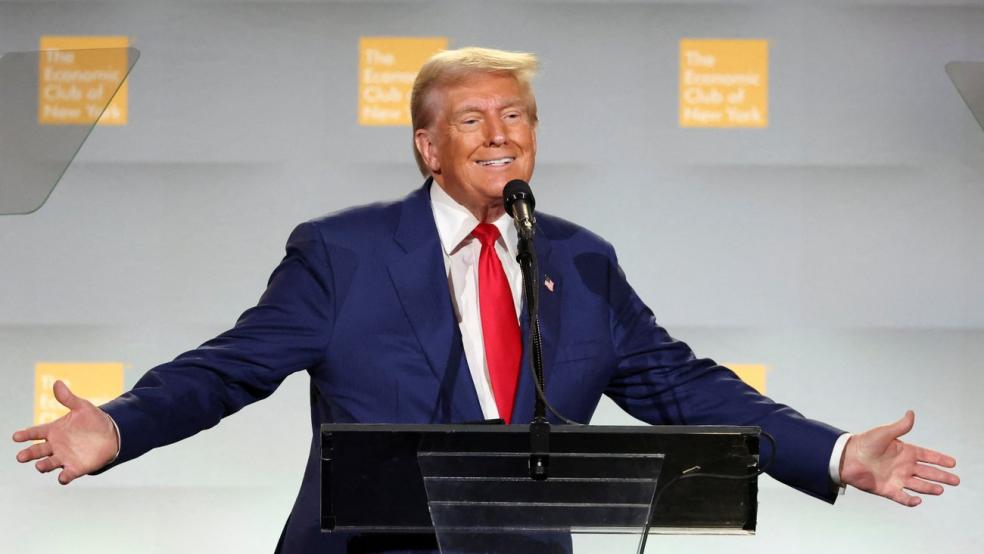In a speech to the Economic Club of New York, former President Donald Trump on Thursday promised to create a government efficiency commission if he’s elected to another term, embracing an idea proposed to him by billionaire Elon Musk. Trump said Musk would lead the panel, which would be “tasked with conducting a complete financial and performance audit of the entire federal government and making recommendations for drastic reforms” that would cut waste, fraud and abuse.
“We need to do it. Can’t go on the way we are now,” the Republican presidential nominee said, drawing applause from the audience, which included Wall Street titans, business and economic leaders and former members of the Trump administration.
Trump claimed the commission’s first order of business would be to develop an action plan to “totally eliminate fraud and improper payments within six months,” which he said would save “trillions of dollars.”
His meandering remarks were littered with a series of false, misleading and sometimes baffling comments along with lofty promises. He again attacked Vice President Kamala Harris as a “radical” and a “Marxist,” and he again painted a dark picture of current and future conditions in the country under Democratic leadership. He called the United States a nation in decline with an economy in crisis. He warned that migrants are “taking the jobs of Hispanic Americans, African Americans.”
As he described his economic agenda, Trump promised to rescind unspent funds approved as part of Democrats’ Inflation Reduction Act, eliminate 10 old regulations for every new regulation enacted, create a U.S. sovereign wealth fund and make America the world capital for cryptocurrency and Bitcoin. He again pledged he would significantly ramp up energy production, which has reached all-time highs under the Biden administration. Trump said it would be “four times higher” if he were in office. He said he would drive down housing costs, and ban mortgages and taxpayer-funded benefits for migrants in the country illegally.
And he repeated his calls for sharply higher protectionist tariffs, which he said would boost domestic production, lower inflation and reduce the deficit.
“We will create the biggest, greatest and strongest middle class in the history of our country,” Trump said. “Some might say it’s economic nationalism. I call it common sense. I call it America First.”
Economists have warned such tariffs would drive up inflation, disproportionately hurting lower-and middle-income consumers and could hurt economic growth.
The former president also said he would make his 2017 tax cuts permanent, which the Congressional Budget Office has said would cost $4.6 trillion over a decade. He said he would lower taxes further, repeating his pledge to eliminate taxes on tips and on Social Security benefits. Trump said he would cut the corporate tax rate, which had been 35% prior to his 2017 tax law, from the current 21% to 15%, though he said companies would have to make their products in the United States to be eligible for the reduced rate. Harris has proposed a 28% corporate tax rate.
Trump also claimed that his administration had proved that targeted tax cuts reduce the deficit, which most economists and analysts vigorously dispute. Trump’s 2017 tax cuts increased the national debt.
Asked after his speech what he would do and what specific legislation he would advance to make childcare affordable, Trump fumbled through an answer in which he suggested that the revenue he would generate through his tariffs and economic growth would be enough to finance childcare and much, much more. “I look forward to having no deficits within a fairly short period of time, coupled with the reductions that I told you about on waste and fraud and all of the other things that are going on in our country,” he said.
The Tax Policy Center recently projected that Trump’s tariffs would generate about $2.8 trillion in net revenue over a decade, which would be far short of wiping out federal deficits that now run about $2 trillion a year. But the audience at the Economic Club of New York gave Trump another round of applause for his response.
Budget
Trump Pitches Wall Street on Tariffs, Tax Cuts and Elon Musk

Reuters




